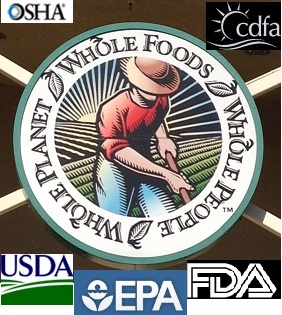The health insurance market place is broken. When hard working Americans can’t find or be offered honest health insurance plans, a necessity in our high cost healthcare environment, the system needs to be repaired. The Affordable Care Act is meant to bring some equilibrium back to the market that for too long has favored health insurance companies. John Mackey, CEO of Whole Foods, compared the ACA to fascist intervention on the part of the government in an interview with National Public Radio. It is obvious that the type of government regulations in the health insurance market place Mackey considers “fascist” are similar other market interventions that benefit his company.
Government directed business or consumer protection
John Mackey’s definition of fascism views any government intervention in the production of goods and services as necessarily evil and bad for the market if those interventions cost his company money. It is clear that John Mackey doesn’t have a “big picture” of our entire economy and how government and business willingly collude together to stabilize markets for consumers and producers.
Labeling of ingredients

Government inspection of meats keeps the consumer safe so they don’t have to use their health insurance.
One of the key aspects I see with healthcare reform is uniform policies and truth in marketing. Just like the government mandates that the manufacturer must identify all the ingredients in a Whole Foods pre-packaged meal item, so must insurance companies tell the consumer what they are buying. Untold times a young couple learns after starting a family that their health insurance doesn’t cover costs associated with maternity. It seems only natural that a health plan would cover a healthcare event like having a baby. Sadly, many of them do not. It is no different than a consumer buying a Whole Foods prepared rigatoni pasta meal only to learn that it is was only the sauce and not the pasta. Labeling laws instill confidence in consumers that when Whole Foods markets a product as “organic”, it truly is organic.
U.S. Farm Bill
Many of the fruits, grains, vegetables, meats and dairy products stocked by Whole Foods are subsidized by the American tax payer. Certainly there is collusion among the government and farmers, also known as agri-business, in the form of the U.S. Farm Bill to keep food staples low. The farm bill includes a host of price support subsidies, one of which for dairy milk producers was set to expire in 2012 and was renewed during the fiscal cliff crisis. While not perfect, the U.S. Farm Bill helps keep small farms and ranches a float with support payments while subsidized grain prices keep feed costs low for beef producers that ultimately translate into cheap hamburgers.

Government inspection of meats keeps the consumer safe so they don’t have to use their health insurance.
Farmers and government collude to restrict supply
There are even a little known collusive government intervention in the fruit and vegetable market place to keep prices high. Marketing Orders, approved by farmers and embodied in state regulations, dictate that only fruit of a certain standard will be sent to the consumer market and they force farmers to pay into bulk marketing programs. Blemished and odd sized fruit are restricted. The Marketing Orders have the effect of limiting consumer supply, increasing the price. Conversely, fruit unable to be marketed in super markets like Whole Foods, builds up excess supply for processed foods companies allowing them to take advantage of lower prices.
Whole Planet-Whole Foods-Whole People
Prominently displayed atop a Whole Foods store is a slogan evoking a commitment to support actions that are good for the planet, food and people. If the planet and food are worthy of government intervention to keep them whole, isn’t the farm worker just as worthy of government intervention to keep him and his family whole? Why should the government regulate commerce to support the health of the planet and not the health of the inhabitants? The government regulates timber, fishery, mining and minerals in an effort toward sustainability and ecological health.
Government rules make food safer leading to less utilization of health insurance
While a restriction may reduce revenue for one company, safety regulations create a whole other industry of safety equipment that makes money for others. Whole Foods was even a supporter of California’s Prop. 37 that would have required mandatory labeling of genetically engineered food. Is such a regulation fascist, socialist or corporatist? Maybe, for Whole Foods, it was just good business sense to support a government regulation that their customers supported.
“Fascist” rules increase profits at Whole Foods
John’s Mackey’s Whole Foods is the beneficiary of a multitude of government regulations, restrictions, subsidies and market intervention. All of the crop subsidies, labeling, clean water and farm worker safety regulations go toward helping them offer raw and processed food at prices where they can make a profit. John Mackey has been gripped with fear and greed: fear of making less money by offering government approved health insurance to his workers on greed to make even more money. You can’t serve two masters. John Mackey needs to understand his success has been built upon the collusion of government, agricultural, environmentalist and farm worker advocates to supply low price, high quality products to his stores. I don’t consider this fascist, I consider it American.



